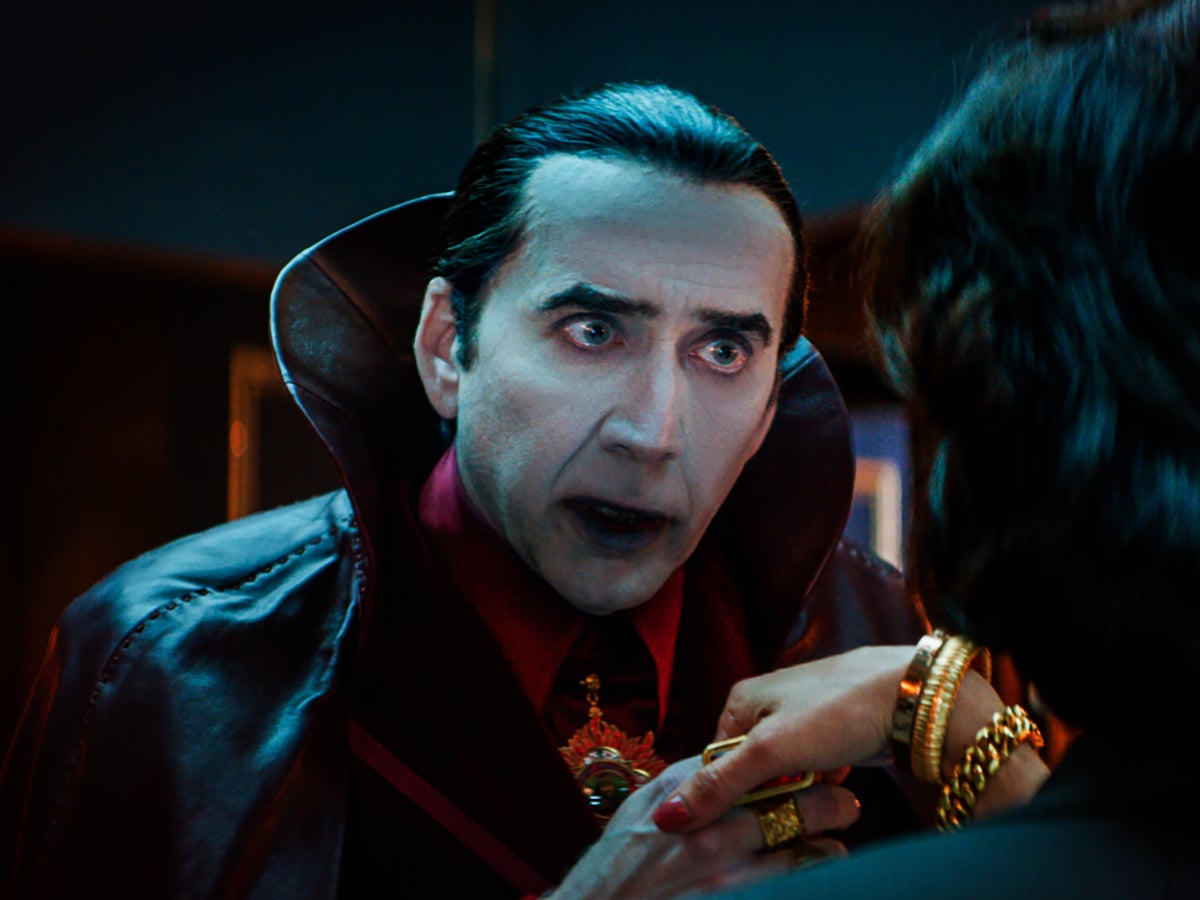
Nicolas Cage has never been better than he is in the pitch-black horror-comedy Vampire’s Kiss (1988), playing the role of a Manhattan yuppie convinced he’s been turned into an immortal bloodsucker. Cage acts in the film with feral sincerity, burrowing deep enough into the madness to find some childlike desire to be seen and loved. He also found the most unthinkable ways of delivering straightforward lines. “Am I getting through to you, Alva?”; “I never misfiled anything! Not once. Not one time!”. They’re inconsequential on paper, but by the sheer, weird force of how he said them, they’ve been immortalised in meme form.
Cage was born to play a vampire. Renfield, then, feels like the long-withheld fulfilment of a promise – the actor finally gets to play the biggest vampire of them all, Dracula. His performance is faultless. There’s an elegance in the Old World elongation of his vowels; a sense of camp in the way he pounces from line to line and emotion to emotion; and, most crucially, a real menace to his haughtiness. Though decades of pop culture may have rehabilitated the vampire as a tragic, marginalised romantic, it’s thrilling to see Cage return Dracula to his demonic origins.
If only Renfield had featured him more. Cage’s performance is instead boxed in by an amusing if somewhat insubstantial movie that reimagines Dracula’s familiar (Nicholas Hoult’s Robert Montagu Renfield) as a hard-done-by millennial terrorised by his narcissistic boss. Hoult, who’s turned in several brilliant, eccentric performances in recent years – The Menu (2022) and The Favourite (2018) among them – has settled back into the comfortable realm of traditional leading man. There’s little to differentiate what he’s doing here and what he did, for example, in zombie romcom Warm Bodies (2013). Renfield is both soulful and bashful, and really quite kind, even when he’s devouring bugs in order to gain uncanny physical abilities. And he’s trapped in an eternal cycle in which his master rises to power, is defeated by the forces of good, and is then forced to recuperate in private. Rinse and repeat.
While on a sojourn in New Orleans, Renfield falls in with a self-help group for those trapped in co-dependent relationships. It’s only then that the penny drops. When he steps in to help a traffic cop (Awkwafina) take down the arrogant son (Ben Schwartz, surprisingly sinister) of a local crime boss (Shohreh Aghdashloo), he’s given a glimpse of what life as a hero could truly be.
Ryan Ridley’s script is framed around Hoult’s whip-cracking narration, torn straight from the achingly self-aware genre films of the late 2000s and early 2010s – think the concept-first horror comedies that appeared in the wake of Shaun of the Dead, such as Zombieland (2009) or The Cabin in the Woods (2011). The rest of Renfield is padded out with tales of supernatural romance and police corruption, albeit drawn without much imagination.
That said, director Chris McKay, of The Lego Batman Movie (2017), has a clear affinity with the material. Renfield is always at its most joyous when it celebrates Dracula’s rich celluloid history – the film’s best sequence inserts both Cage and Hoult into Tod Browning’s Dracula (1931), in the roles once played by Bela Lugosi and Dwight Frye.
Prosthetics are allowed to take centre stage, thanks to the multiple stages of Dracula’s physical revival (at certain points, he really looks quite ghoulish). He’s dressed in glittery blazers and rich velvet. And the film’s action sequences aren’t meek when it comes to the blood and viscera – Renfield can tear both arms right off a person’s body, and then their face, too. It’s only regrettable that the film itself didn’t heed one of cinema’s most important lessons – when you put Nicolas Cage in a movie, it’s guaranteed no one will care about anything other than Nicolas Cage.
Dir: Chris McKay. Starring: Nicolas Cage, Nicholas Hoult, Awkwafina, Ben Schwartz, Adrian Martinez, Shohreh Aghdashloo. 15, 93 minutes.
‘Renfield’ is in cinemas now







